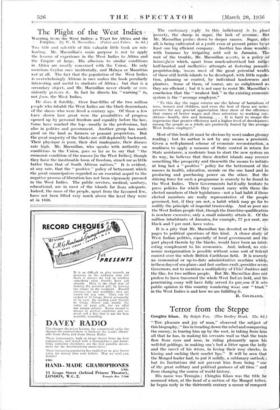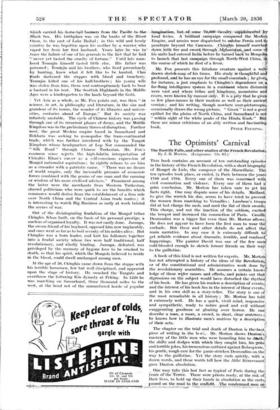Terror from the Steppe
Genghis Khan. By Ralph Fox. (The Bodley Read. 22. 6d.) " THE pleasure and joy of man," observed the subject of this biography, " lies in treading down the rebel and conquering the enemy, in tearing him up by the root, in taking from hint all that he has, in making his servants wail so that the tears flow front eyes and nose, in riding pleasantly. upon his well-fed geldings, in making one's bed a litter upon the belly and the navel of his wives, in loving their rosy cheeks, in kissing and sucking their scarlet lips." It will be seen that the Mongol leader had, to put it mildly, a sublunary outlook; but its limitations did not prevent him from being " one of the great military and political geniuses of all time " and from changing the course of world history.
His name was Temujin ; Chinghis Khan was the title he assumed when, at the head of a section of the Mongol tribes, -he began early in• the thirteenth century a- career of conqueit
:Witioltcarried-his hoise-tail !banners from the Pacific-to:the: :Black Sea. His birthplace was on the banks of the River .(loon, to the east of Lake Baikal ; in this wild and lovely country he was begotten upon his mother by a warrior who
raped her from her first husband. Years later was to trace the-failure of one of his generals to the fact that he hid "" never yet tasted the cruelty of fortune." Until late man- hood Temujin himself tasted little else. His father was t • . -poisoned ; Tendijin and his brothers, who lived precariously. by hunting, knew what it felt like to be hunted. Clan feuds darkened the steppes with blood and treachery. feuds killed one of his half-brothers ; his young wife *as stolen from him, them sent contemptuously back to bear a-bastard in his tent. The Scottish Highlands in the Middle Ages were a kindergarten to the lands beyond the Gobi.
Yet Asia as a whole, as Mr. Fox points out, was then " in science, hi art, in philosophy and literature, in the size and grandeur of its towns, the wonder of its libraries and univer- sities, centuries ahead of Europe." But its society was infinitely unstable. The cycle of Chinese history was passing through one of its recurrent phases of decay, and the Middle Kingdom was in the preliminary throes of disruption. Further west, the great Moslem empire based in Samarkand and Bokhara was seeking to monopolise the trans-continental trade, which was further interfered with by the Tangut Kingdom whose headquarters at Lop Nor commanded the " Silk Road " through Chinese Turkestan. Mr. Fox's comMon sense rejects the high-falutin interpretation of Chinghis Khan's career as a self-conscious expression of Mongol nationalist aspirations ; he rightly refuses to see hint as a crusader with a patriotic cause. " There was no decant of world empire, only the inexorable pressure- of economic forces combined with the genius of one man and the cunning or wisdom of his more civilised advisers." Prominent among the latter were the merchants from Western Turkestan, shrewd politicians who were quick to see the benefits which commerce would derive from the establishment of a firm rule over North China and the Central Asian trade routes ; it is interesting to watch Big Business so early at work behind the scenes of war.
" Out of the disintegrating :feudalism of the Mongol tribes Chinghis Khan built, on the basis of his personal prestige, a nucleus of organised loyalty. It was not easily done. Jamuga, the sworn friend of his boyhood, opposed him now implacably, and once went so far as to boil seventy of his nobles alive. But Chinghis was a born leader, and knit his followers together into a feudal society whose ties were half traditional, half revolutionary, and wholly binding. Jamuga, defeated, was privileged by the memory of bygone love to be crushed to death, so that his spirit, which the Mongols believed to reside in the blood, could-dwell unchanged among men.
At the age of 50, Chinghis came down from the steppe with his terrible horsemen, few but well disciplined, and appeared upon the stage of history. He. smashed the Tanguts and overthrew the tottering Kin 'dynasty at Peking. In 1220 he was marching on Samarkand, three thousand miles to the west, at the head not of the unnumbered horde of popular =i canon-, sore 40:0964Favftliik triPiA bteufe'd 71Y local levies. A -brilliant campaign conquered the Moslem Empire, and armies were dispatched to subdue Persia and: penetrate beyond the Caucasus. Chinghis himself march down With fire and swortlltroughAfghanbiton,inad some his units had entered India before he turned back to Mongo to launch that last campaign through North-West China,' the course of which he died of a fever.
t
. Mr. Fox presents this fabulous creature against a well; drawn sketch-map of his times. His study inthoughtful an profound, and he has an-eye for the small essentials ; he giv for instance, a just emphasis to Chinghis's dependence on:A far-flung intelligence system in a continent where distant4 were vast, and ..where_ tribes and .kingdoms., mountains ant( rivers, were knoWn by rumour only. It is 'a pity that he giv so few place-names in their modern as well as their and version ; and his writing, though nowhere over-picturesq* occasionally draws the wrong picture. " Green "-is not a epithet for the plains of North China, and Samarkand is not " within sight of the white peaks of the Hindu Kush." Blif these are minor criticisms of an ably written and fascinating.



































































 Previous page
Previous page